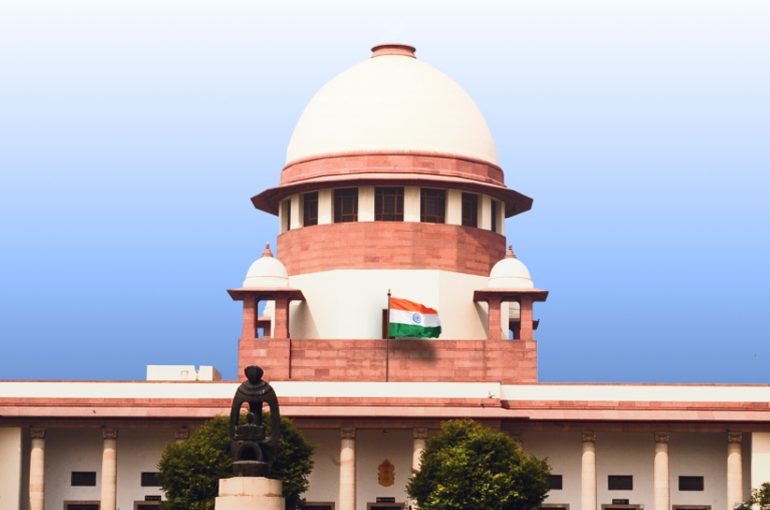Supreme Court Upholds Financial Viability Requirement for Registration of Co-operative Societies
 A Division Bench of the Supreme Court consisting of Justice Vikram Nath and Justice Prasanna B Verale passed a Judgment dated April 2,2025 in the case of Shri. Masaidevi Vividh Karyakari Sahakari Seva Sanstha Maryadit Warewadi Versus the State of Maharashtra & Ors. SLP (CIVIL) NO. 4090 of 2024 wherein the Supreme Court upheld the Order passed by the High Court by which Order it did not allow the registration of societies which are not financially viable.
A Division Bench of the Supreme Court consisting of Justice Vikram Nath and Justice Prasanna B Verale passed a Judgment dated April 2,2025 in the case of Shri. Masaidevi Vividh Karyakari Sahakari Seva Sanstha Maryadit Warewadi Versus the State of Maharashtra & Ors. SLP (CIVIL) NO. 4090 of 2024 wherein the Supreme Court upheld the Order passed by the High Court by which Order it did not allow the registration of societies which are not financially viable.
The Present Appeal originates from the Common Order dated 05.01.2024 in Writ Petition No. 8654/2023 and 42 connected matters wherein the Bombay High Court allowed the petitions preferred by the Respondent No. 6 and set aside the orders passed by State of Maharashtra directing registration of the Appellant-societies.
Facts of the Case:
That on 13.01.2023, the Appellant-Society filed an Application to Respondent- Assistant Registrar for getting permission for registration of proposed society as a new Primary Agricultural Credit Co-operative Society as well as for opening a bank account. The application filed by the Appellant-society was rejected on 13.04.2023 by the Scrutiny Committee. One of the reasons for refusal was that the existing society was not financially viable. And it would not be appropriate to allow registration of same type, same objectives, within area of operation of existing society when the same is not financially viable.
Then an Appeal under Section 152 of the Maharashtra Co-operatives Societies Act, 1960 was filed. The Minister Co-operatives on behalf of the State allowed the Appeal and set aside the Order dated 13.04.2023 directing the Respondent- Assistant Registrar to register the Appellant-society.
Contention of the Appellant
The Appeal on behalf of the Appellant was that the Applicant-Society could provide loans as per the norms. They further argued that as per the policy of the Central Government, the Applicant society can do about 152 types of business other than loan distribution and thereby become profitable.
They also asserted that the Appellant is the first and only Cooperative society in the said Revenue village. It is not possible to have share capital of Rs. 5 Lakhs at the time of applying for registration. However, they are ready to give undertaking to raise required share capital of Rs. 5 lakhs within one to three years from date of registration of society.
Contentions of the Respondent
The Appellant has failed to satisfy the threshold criteria and conditions to establish its own viability. That the Appellant has sought to artificially inflate its membership by showing dead persons so as to show a membership with larger land holdings in order to meet the viability criteria.
Analysis of the High Court
The High Court held that the Petitioners who are neither existing co-operative society or members of the existing co-operative societies lack locus standi to challenge the impugned orders. The Scrutiny Committee has held that the Societies will not be financially viable and they do not fulfil the requisite financial parameters.
Analysis of the Hon’ble Supreme Court
The Supreme Court conjointly read Section 4 and Section 6 of Maharashtra Cooperative Societies Act 1960 that clarifies the economic viability of a society to be pre requisite of basic condition for grant of registration to the society. The Hon’ble Supreme Court held that the State ignored this basic criterion while deciding the issue. The Appellant laid down the submissions that any Cooperative Society can manage 152 kinds of business apart from giving loans without any supporting material on record.
That if such a society is allowed, it might not be able to function and will adversely affect members of society. It would ultimately frustrate the very object and establishment of the said society. The Hon’ble Supreme Court clearly held that relaxing the necessary pre-requisites can only be made through Government Resolution and not at the whims of the State. Thus it upheld the Order passed by the High Court.
Conclusion
In conclusion, the Supreme Court, in its judgment dated April 2, 2025, in the case of Shri. Masaidevi Vividh Karyakari Sahakari Seva Sanstha Maryadit Warewadi Versus The State of Maharashtra & Ors., upheld the decision of the Bombay High Court that denied the registration of financially non-viable societies. The Court emphasized that economic viability is a fundamental prerequisite for the registration of a co-operative society under the Maharashtra Co-operative Societies Act, 1960. The Appellant’s argument that it could engage in a variety of businesses to generate profit lacked sufficient evidence to demonstrate the society’s financial stability. The Court reiterated that relaxing the necessary financial criteria could only be done through a formal Government Resolution, not based on discretionary decisions. Therefore, the Supreme Court affirmed the High Court’s ruling, reinforcing the importance of financial viability in the establishment of co-operative societies, to ensure they serve their intended purpose without jeopardizing their members’ interests.
TRISHA SAXENA
SENIOR LEGAL ASSOCIATE
THE INDIAN LAWYER & ALLIED SERVICES
Please log on to our YouTube channel, The Indian Lawyer Legal Tips, to learn about various aspects of the law. Our latest video, titled Everything You Need to Know About Property Gift Deeds‘, can be viewed at the link below:
https://youtu.be/w4SdbYPfXyg?si=xEZsWesV-uM8Rc7u





































Leave a Reply